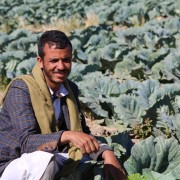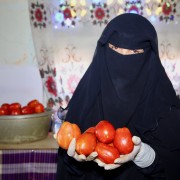Speeches Shim

Ahmed has been a farmer all of his life, like his father and grandfather before him. He grows garlic, cabbage, tomatoes, and beans on his 18 acre plot in Dhamar, Yemen. However, due to the conflict, farmers like Ahmed contend with fuel shortages and extreme price hikes for inputs. As a result, many farmers across the country are now left with barren fields. Even though Ahmed has continued to farm through this crisis, he has found it increasingly difficult to buy fuel to pump water from his well—forcing him to farm smaller areas and produce lower quality crops.

The Arab Spring has yet to deliver the jobs and improved livelihoods so many had hoped for. Nowhere is the situation more acute than in Yemen, where five years of violent conflict have pushed the population to the brink of famine, sparking the world’s most dire economic and humanitarian crisis. If and when a peace agreement is reached, experts project that Yemen will be home to upwards of one million former combatants who will need to be reintegrated into society. In addition to providing critical humanitarian aid to the Yemeni people, USAID is leading strategic initiatives that guide at-risk populations toward productive activities that can contribute to the country’s stability and reconstruction.

Roaida Ahmed lives with her husband and their three children in the Yemeni village of Al-Qara’a. For years, they made their living through farming, with tomatoes being a major crop. However, due to the ongoing war, farming no longer offers a viable source of income. Water is scarce, fuel prices are high, and the roads to the markets are no longer safe. As a result, Roaida’s family, like so many in Yemen, lives on the brink of famine.

Rana is a Yemeni college student who will graduate this year with a bachelor’s degree in business. She and her peers face extraordinary challenges finding jobs and planning for their futures. Their war-torn country is suffering an economic and humanitarian crisis that has driven its people to the brink of famine. Yemen’s population is one of the youngest in the world, with 75 percent under 30 years old. Faced with these obstacles, many young people turn to criminal activity and political violence. For Yemen to advance on its journey to stability and self-reliance, young people, like Rana, must be empowered to find sustainable work.

Comment
Make a general inquiry or suggest an improvement.